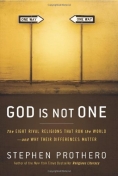BKMT READING GUIDES
God Is Not One: The Eight Rival Religions That Run the World--and Why Their Differences Matter
by Stephen Prothero
Hardcover : 400 pages
0 club reading this now
0 members have read this book
At the dawn of the twenty-first century, dizzying scientific and technological advancements, interconnected globalized economies, and even the so-called New Atheists have done nothing to change one thing: our world remains furiously religious. For good and for evil, religion is the ...
Introduction
(
At the dawn of the twenty-first century, dizzying scientific and technological advancements, interconnected globalized economies, and even the so-called New Atheists have done nothing to change one thing: our world remains furiously religious. For good and for evil, religion is the single greatest influence in the world. We accept as self-evident that competing economic systems (capitalist or communist) or clashing political parties (Republican or Democratic) propose very different solutions to our planet's problems. So why do we pretend that the world's religious traditions are different paths to the same God? We blur the sharp distinctions between religions at our own peril, argues religion scholar Stephen Prothero, and it is time to replace na�ve hopes of interreligious unity with deeper knowledge of religious differences.
In Religious Literacy, Prothero demonstrated how little Americans know about their own religious traditions and why the world's religions should be taught in public schools. Now, in God Is Not One, Prothero provides readers with this much-needed content about each of the eight great religions. To claim that all religions are the same is to misunderstand that each attempts to solve a different human problem. For example:
?Islam: the problem is pride / the solution is submission
?Christianity: the problem is sin / the solution is salvation
?Confucianism: the problem is chaos / the solution is social order
?Buddhism: the problem is suffering / the solution is awakening
?Judaism: the problem is exile / the solution is to return to God
Prothero reveals each of these traditions on its own terms to create an indispensable guide for anyone who wants to better understand the big questions human beings have asked for millennia?and the disparate paths we are taking to answer them today. A bold polemical response to a generation of misguided scholarship, God Is Not One creates a new context for understanding religion in the twenty-first century and disproves the assumptions most of us make about the way the world's religions work.
Amazon Exclusive: A Letter from Stephen ProtheroOn my last visit to Jerusalem, I struck up a conversation with an elderly man in the Muslim Quarter. As a shopkeeper, he seemed keen to sell me jewelry. As a Sufi mystic, he seemed even keener to engage me in matters of the spirit. He told me that religions are human inventions, so we must avoid the temptation of worshipping Islam rather than Allah. What matters is opening yourself up to the mystery that goes by the word God, and that can be done in any religion. As he tempted me with more turquoise and silver, he asked me what I was doing in Jerusalem. When I told him I was researching a book on the world's religions, he put down the jewelry, looked at me intently, and, placing a finger on my chest for emphasis, said, "Do not write false things about the religions."
As I wrote God is Is Not One, I came back repeatedly to this conversation. I never wavered from trying to write true things, but I knew that some of the things I was writing he would consider false.
Mystics often claim that the great religions differ only in the inessentials. They may be different paths but they are ascending the same mountain and they converge at the peak. Throughout this book I give voice to these mystics: the Daoist sage Laozi, who wrote his classic the Daodejing just before disappearing forever into the mountains; the Sufi poet Rumi, who instructs us to "gamble everything for love"; and the Christian mystic Julian of Norwich, who revels in the feminine aspects of God. But my focus is not on these spiritual superstars. It is on ordinary religious folk?the stories they tell, the doctrines they affirm, and the rituals they practice. And these stories, doctrines, and rituals could not be more different. Christians do not go on the hajj to Mecca; Jews do not affirm the doctrine of the Trinity; and neither Buddhists nor Hindus trouble themselves about sin or salvation.
Of course, religious differences trouble us, since they seem to portend, if not war itself, then at least rumors thereof. But as I researched and wrote this book I came to appreciate how opening our eyes to religious differences can help us appreciate the unique beauty of each of the great religions--the radical freedom of the Daoist wanderer, the contemplative way into death of the Buddhist monk, and the joy in the face of the divine life of the Sufi shopkeeper.
I plan to send my Sufi shopkeeper a copy of this book. I have no doubt he will disagree with parts of it. But I hope he will recognize my effort to avoid writing "false things," even when I disagree with friends. --Stephen Prothero
Discussion Questions
No discussion questions at this time.Book Club Recommendations
Recommended to book clubs by 0 of 0 members.
Book Club HQ to over 90,000+ book clubs and ready to welcome yours.
Get free weekly updates on top club picks, book giveaways, author events and more









